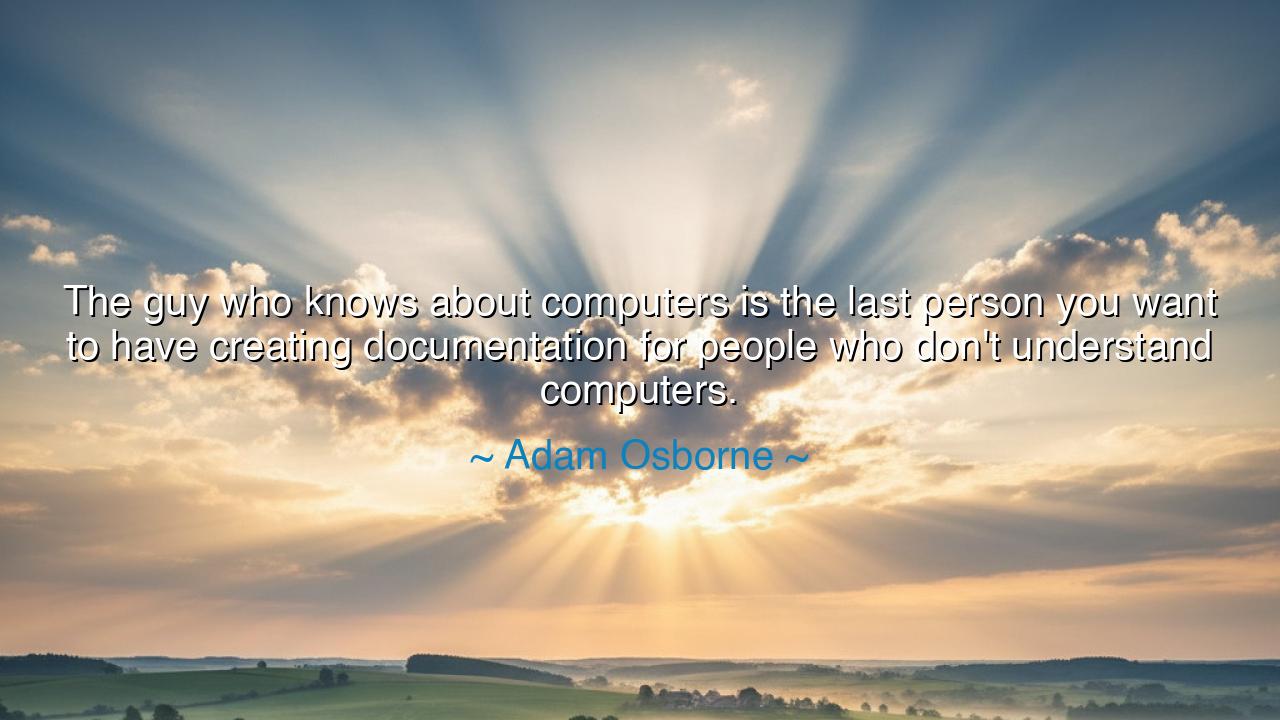
The guy who knows about computers is the last person you want to
The guy who knows about computers is the last person you want to have creating documentation for people who don't understand computers.






"The guy who knows about computers is the last person you want to have creating documentation for people who don't understand computers." – Adam Osborne
In the vast landscape of human progress, we often find ourselves facing the tension between knowledge and understanding. Adam Osborne speaks to a fundamental truth about the world we now inhabit, one where the most brilliant minds in technology often fail to connect with the very people who will ultimately benefit from their innovations. The technician, in all their brilliance, is often the last person equipped to translate their vast knowledge into language that the uninitiated can comprehend. This divide between the expert and the layperson has existed since the dawn of civilization, and it continues to shape our world in ways both subtle and profound.
In the ancient world, the wise and the learned were often seen as those who held knowledge—but this knowledge was not always meant for the common people. The great philosophers of old, such as Plato and Aristotle, would impart wisdom in ways that were not always easily accessible to all. The teachings of the philosophers were often veiled in complex language and metaphor, meant to challenge the intellectual elite, rather than instruct the common man. However, those who sought to bridge this gap—like Socrates, who used simple questions to elicit wisdom from his listeners—understood that knowledge must be shared in a way that is accessible to everyone, regardless of their background.
The same challenge exists today in the world of technology. Those who create the systems and tools that drive our modern world are often so deeply immersed in the technicalities of their craft that they lose sight of the language and concepts that are foreign to the average user. Osborne’s words remind us that knowledge must be communicated clearly if it is to be effective. Just as the ancient scribes and teachers had to learn how to write and speak in a way that their students could understand, so too must modern-day technicians and programmers be able to translate their intricate understanding of technology into something that the everyday person can grasp and use.
In many ways, this divide between the expert and the common person mirrors the divide between the rulers and the ruled in ancient societies. Take, for example, the time of Alexander the Great, when the knowledge of the military and the strategies that shaped his conquests were often kept within the elite circles of generals and advisors. The common soldier, though essential to the army, rarely had access to the broader understanding of the strategic vision. This knowledge, powerful and transformative, was limited to a select few. The same happens today in technology: the vast complexity of modern systems is often hidden behind a veil, understood only by those who have the specialized knowledge to navigate it. It is the task of the communicator—the teacher, the translator—to break down these barriers, so that all can benefit.
Consider the great scientific revolution of the 17th century, where the discoveries of Galileo, Newton, and others were groundbreaking, but often locked in the language of mathematics and theory. It was not until later that these ideas were popularized, made accessible, and spread to the broader public. In the same way, modern technology must be made understandable to the common person—not through jargon and complexity, but through clarity and simplicity. The true challenge for any technology creator is not simply to build, but to communicate. For only when knowledge is accessible to all, can it have its full impact.
The lesson here is that knowledge is only truly powerful when it is shared, when it is made comprehensible to those who need it most. The best minds in technology must embrace the role of the teacher—translating the intricate, the complex, and the technical into a language that resonates with the broader world. To do so requires empathy, an understanding that technology exists not for the elite, but for everyone. We must not forget that it is not just the genius of the creator that matters, but their ability to make their creations accessible and useful to all.
As we move forward in our own lives, let us embrace this dual role—being both creators and communicators. Whether in our careers, in our relationships, or in our communities, we must learn the art of translating knowledge into something usable, understandable, and applicable to the lives of others. Like the great philosophers and scientists of the past, we must remember that knowledge, when shared, has the power to transform the world, but only if it is made clear to those who need it most. Let us strive not only for knowledge, but for the ability to make it meaningful to others, for in that lies true power.






AAdministratorAdministrator
Welcome, honored guests. Please leave a comment, we will respond soon